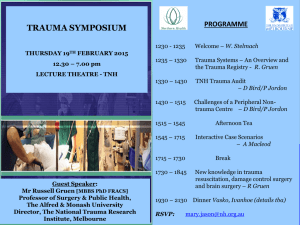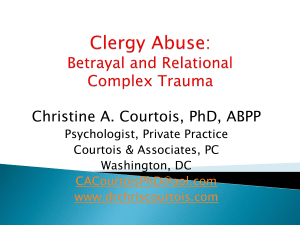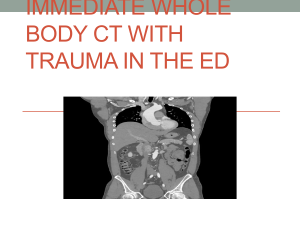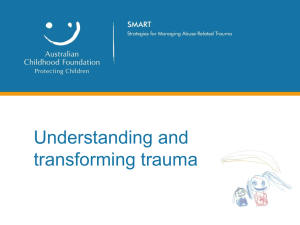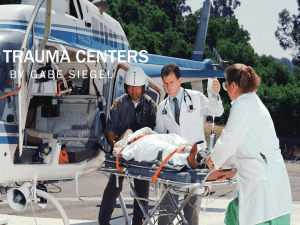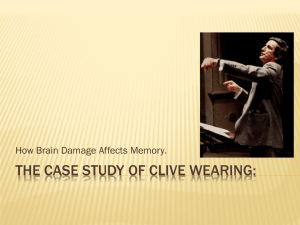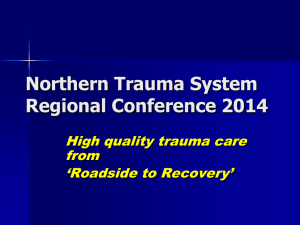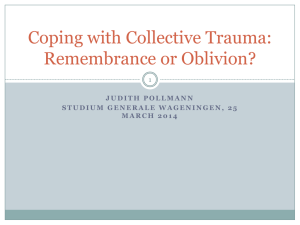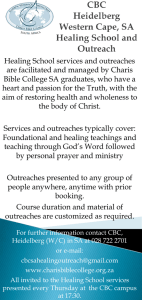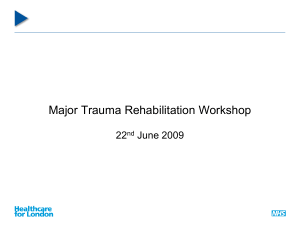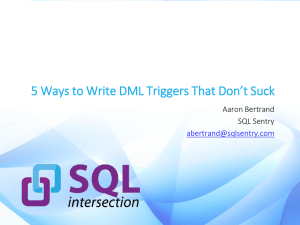powerpoint - Canadian Domestic Violence Conference
advertisement
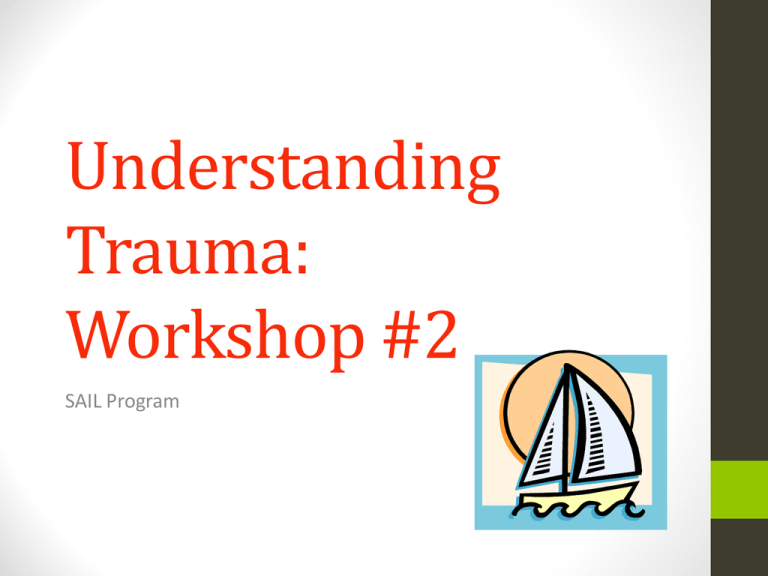
Understanding Trauma: Workshop #2 SAIL Program • As before, self care is one of the most important things to learn and practice in the healing journey. • As the workshop continues, keep one part of your mind on observing how you’re doing. • If you need to - get up, stretch, get a cup of tea, deep breathe or practice a grounding exercise. 4/13/2015 Welcome! • This workshop will take about 3 hours, and we will have 2 10 minute breaks in the middle of it. • Washrooms are located outside. Get up and go at any time if you wish. • Help yourself to coffee or tea at any time. • You will not be asked to share any personal information. 4/13/2015 Understanding Trauma • If you meet someone you know here, respect their confidentiality outside of our agency. • We hope that in this process, you can feel good about having been here today, and in beginning, or continuing, your healing journey. • Feel free to ask questions at any time! 4/13/2015 Remember Self Care • Sit where you are most comfortable. Some may want to face the door or have no one behind them. • Feel free to bring a small comfort object, or grab a stone. • You may ‘zone out’ or find yourself daydreaming. It’s ok. • You can help yourself with this here also by ‘grounding’ yourself. 4/13/2015 Remember Self Care • Last time we learned the ‘breath’ exercise. This time, a different grounding exercise. • 5-5-5 • Take several deep elevator breaths. • Look around you, and mentally pick out 5 things you see, then 5 things you hear, then 5 things you can feel. • Repeat, 4-4-4, then 3-3-3 4/13/2015 Grounding Exercise • Learning about trauma is important to help in the healing from it • There are many steps to healing, helping yourself is often a forward and back process of gradually making shifts in your thinking and behaviour • Change is hard…appreciate yourself for the task you have taken on! Have compassion for yourself in this journey. 4/13/2015 Healing from Trauma • You can increase your resilience through focussing on two main areas • MIND – the way you perceive information and think - determining how you feel • BODY – the way your body is able to achieve sleep and rest, deal with stress and change its response • Mind and body are connected. 4/13/2015 Increase your resilience • Western medicine is gradually coming to recognize that viewing mental health as separate from physical health is wrong (some drs) • Events that change ‘wiring’ in the brain change it in bodily systems too. • ‘Disease’ may stem from the body’s attempts to manage something unmanageable. Emotions influence physical changes. Dr. Gabor Maté 4/13/2015 Mind and Body are ONE • By choosing to come to these workshops, you are choosing to care for yourself. • The next part of our workshop will be on helping you begin to recognize and work with some of the ways abuse trauma has impacted you. 4/13/2015 Healing • People who live through the trauma of sexual abuse or other forms of violence may develop symptoms of post trauma stress as a reaction to the violence they have lived and witnessed. • Post trauma stress involves changes to many systems of the body – we are wired for survival and the experiences change our ‘wiring’. Remember, we are mammals. 4/13/2015 Abuse can be traumatic • Exposure to event(s) that separate you from a sense of safety and security in your life • There is a threat or violation of bodily integrity • Survival may be questioned • Witnessing of such an event with another 4/13/2015 Trauma occurs when there is: • Our bodies are designed to help us survive. • Various reactions in the body are designed to help us cope – the fight/flight/freeze response • Your body will choose the best response for survival, and store as trauma memory many markers associated with the event. 4/13/2015 At the time of trauma • Many people can describe the fight/flight response but know less about the freeze response, most common in child sexual abuse. • Children are unable to fight or run from adults, so the body releases chemicals (opioids) to distract and lessen pain. • This dissociated state may repeat many times in response to abuse, or just stress. 4/13/2015 The Freeze Response • After any traumatic event, it is common to experience intrusive thoughts or flashbacks, difficulties with hyperarousal – sleep problems, startle easily, anxiety and possibly a sense of unreal withdrawal from life • Experiencing this for 8 weeks after is normal • Past 8 weeks, the body’s ability to heal may become more compromised if there is an ongoing stress response – post traumatic stress disorder? 4/13/2015 Post Trauma Stress? • When children undergo years of living in an abusive and/or neglectful environment, trauma is occurring over years and through their developmental stages of growth • This kind of trauma affects them on many levels, as their bodies are developing in this ‘soup of stress’. The results don’t show up till later. • Many SAIL clients have experienced this, and healing from it takes time, and focus on learning some skills not learned in childhood. 4/13/2015 Complex Trauma • Many survivors share the following experiences, as a result of our ‘survival’ wiring. • Healing is helped when you begin to recognize when your body is ‘reacting’ as though abuse might happen at any time, even though you are safe. • Your body acts this way as part of its wiring for survival…that’s just normal. 4/13/2015 Common Experiences • A ‘trigger’ may be a person, place, thing, smell, sound, expression, season, or even a cloud formation…an endless list. • A trigger represents a piece of information your body stored as a marker of a time when you experienced trauma. • It is your body’s way of alerting you that there might be danger in the present, but you may not relate the trigger to the trauma. 4/13/2015 Triggers • Your perception of a trigger sets off the alert system in your body. You may experience heart racing, a feeling of fear or rage, a need to escape, or a strong sense you are in danger. • Many survivors describe feeling they are going crazy, as this comes on so suddenly, and they ‘know’ they are safe. • Work on identifying and recognizing the pattern of your triggers will help you. 4/13/2015 Triggers • Blue screen • Taxi driver’s hands • White truck • Common examples of triggers for sexual assault survivors include the smell of alcohol on breath, and particular seasons or times of year, or times of day. • Issues with touch/sexuality are almost universal for survivors of sexual abuse. 4/13/2015 Trigger Examples • You might be aware of some of your triggers, but may not be aware of others. • Begin to make a list of known triggers for yourself…you can help yourself by doing this when you are not triggered. • Learning to recognize that you are triggered helps you realize you are not crazy, it is just a normal reaction to the old abuse trauma. • You are OKAY NOW…. (we have to teach your body that too) 4/13/2015 Try and Identify Triggers When you are triggered: • Ground yourself, get your self a little physically calmed down asap. • Remind yourself of your triggers, it is your body remembering the ‘marker’, but you are safe now. • Talk to yourself, reassuring yourself and comforting yourself. • Try to be compassionate with yourself. 4/13/2015 Trigger ‘Retraining’ • It isn’t always possible to ‘avoid’ a trigger but many survivors will try this as a solution, sometimes greatly restricting their lives in the process. • Try ‘working’ your trigger. • Desensitize yourself through gradual exposure to the trigger. (can do in therapy) • Communicate with others about a trigger. 4/13/2015 ‘Work’ your Triggers • Change it up using the senses…if a smell is a trigger, mindfully introduce a smell you like. • Put visual reminders around your home, or in your purse, that represent 2012, not when you were a child. Remove childhood objects. • If some triggers are related to times of year, mindfully prepare, and create a ‘new, good story’ for this time period. (like holidays, do something different this year, that you will enjoy) • Use your creativity. 4/13/2015 How do I work it? • Many of you have experienced flashbacks or intrusive thoughts, ‘thought movies’, nightmares or even physical sensations in your body which make you think you are re-living the traumatic event. • These are very troubling, as the old emotions (fear) return with the thought…more on this in workshop #3. 4/13/2015 Flashbacks and Intrusive Thoughts • Flashbacks also can create a sense of feeling ‘crazy’, but they usually occur in response to a trigger in the present environment. • Ground yourself after a flashback. • Take steps to look at your present situation. Is there a trigger for past abuse in the present? Even a subtle one? • Work on reducing stress and increasing safety, reminding self of safety now. 4/13/2015 Ground after a Flashback • This refers to the body’s almost constant state of stress for people with posttraumatic stress. • Hyperarousal means an overload of stress hormones - adrenaline and cortisol in the system, resulting in difficulties relaxing, sleeping, or feeling calm. • Many survivors will show an exaggerated ‘startle’ response. 4/13/2015 Hyperarousal • MRI snapshots of people who have PTSD show differences in the brain’s adaptation to the ongoing stress – the ability to calm down becomes ‘burned out’ over time • The constant release of adrenaline and cortisol, the body’s main stress hormones, can cause damage over time to many body systems, with health issues arising • Reducing stress is VITAL to healing 4/13/2015 The body’s response • Often survivors have learned to dissociate in childhood. • Everyone dissociates sometimes – daydreaming to more severe dissociation • Dissociation may cause you to lose concentration, and lose ‘time’. • While helpful during the abuse itself, frequent dissociation long after the abuse has stopped causes many problems for survivors. (can’t keep concentration) 4/13/2015 Dissociation or Withdrawal • Many survivors have struggled with addictions to illegal or prescription drugs, alcohol, gambling and so on, in order to cope with the difficulties caused by triggers, flashbacks, hyperarousal and dissociation. (Escape – but often with other life consequences ) • As part of healing, resolving addictions and developing other ways of coping are part of the work… 4/13/2015 Coping with all this? • Many who have suffered trauma feel guilt or shame for the ‘freeze’ response and ‘failing’ to protect themselves or others • It is important to understand these responses are instantaneous instinctive responses to perceived threat, not chosen by careful consideration (Rothschild 2000) • You cannot ‘choose’ how to respond, so don’t feel guilty for something that physically was beyond your choice. 4/13/2015 Trauma Guilt • Prolonged, repeated, extensive exposure to traumatic events through childhood, so no 8 week response, then calm… • Nature of trauma involved interpersonal relationship (vs. natural disaster) • Type of attachment with caregiver is a factor (insecure vs secure) • Majority of SAIL clients have these impacts 4/13/2015 Complex or Developmental Trauma • Post Trauma there are changes in all the systems in the body as our ‘calm down now’ signals burn out and the adrenal gland gets tired too • Many survivors have ongoing anxiety, fatigue and/or depression • Sleep, stomach, bowel, nerve (pain or numbness) and cardio problems all connect to ongoing stress 4/13/2015 Symptoms in the body too • Anxiety and ongoing stress wear on the body– years of panic attacks, large startle response, heart palpitations, hypervigilance • Sleep affected-insomnia and sleep disorders common (who can sleep if danger is present?) • SNS takes energy away from normal body functions like digestion • Digestive system symptoms include reflux, dietary changes (wheat/dairy) and irritable bowel disorders (Rochschild 2000) 4/13/2015 The body bears the burden • The constant triggers break down brain circuitry and body systems… • Immune system suppressed • Chronic pain or fatigue – fibromyalgia associated with PTS • Psychogenic seizures • MS type symptoms also common (Gabor Mate, 2003) 4/13/2015 Chronic Stress • You have to teach your body to calm • De-stressing can include many strategies • Just a few include grounding yourself, learning to breathe, mindfulness, yoga, exercise and self care • You can lower anxiety to help yourself sleep • Diet and vitamin supplements are also key – more on this in workshop #4 4/13/2015 You can help your body heal too • At our 4th workshop, we will explore further ways you can re train your mind and body after trauma. • Work on healing involves both ‘talking’ about what happened, but also ‘retraining’ your body to calm itself. • There are many things you can do to help yourself, therapy is just one of them… 4/13/2015 Self Care and Resiliency • Workshop #3 next week will build on some of the information here regarding trauma, and the links with emotions and memories, with more strategies for you to use. • Workshop #4 will be focussed on how you can build your resiliency, and will offer many strategies for healing. You will begin to consider what your needs and next steps are for healing. 4/13/2015 Workshops 3 & 4 • There has been a lot of information for you today, and you may find that discussion of trauma brings back a few memories for you. • Work on grounding yourself this week – breathing, and 5-5-5. • Allow yourself some leeway from the day to day stresses and expectations, and give yourself some ‘me’ time this week. 4/13/2015 Self Care 4/13/2015 Work on Relaxation
